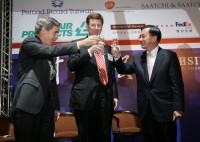President Chen's Remarks at 2006 AmCham Hsieh-Nien-Fan

With ballots of love and democracy, the 23 million people of Taiwan have, step by step, made remarkable strides in consolidating and deepening the democracy in Taiwan. And the US government's longstanding support for Taiwan -- in the realms of politics, security and economic and trade -- has empowered Taiwan's democracy to attain a "silent revolution" in peace and stability, and eventually transform into a force to be reckoned with in the global "community of democracies" and "consortium of economies." I believe President Bush's strong commendation for Taiwan's democracy last year in Kyoto, Japan, is a clear confirmation of the "steadfast partnership" that exists between our two countries.
Taiwan and United States have forged a "Constructive Democratic Alliance" together, putting emphasis on respecting the voice of the people, increasing the transparency of democratic decision-making, and focusing on effective communication both internally and externally. As a result, Taiwan-US relations have continued to build from the foundation of "candid and pragmatic communication" that aims to create a win-win situation for both our countries.
The greatest divide between authoritarianism and democracy lies in the abiding respect that democratic countries have for people's diverse opinions and their deep conviction in resorting to rational and pragmatic communication and cooperation to resolve existing differences. The hallmark of democracy has manifested in the way Taiwan government conducts itself in communicating on issues such as the resumption of American beef import, efforts to promote the Taiwan-US Free Trade Agreement, and measures to deepen democracy and strengthen good governance.
I believe that "deference to professional expertise," "rationality in decision-making," "straightforward clarification," and"efforts in winning support," constitute the basic principles upon which misunderstandings can be resolved, mutual trust can be fostered, and a win-win situation and sustainable developments for all can be achieved.
Dear friends in the American Chamber of Commerce: we recognize you for the instrumental role you play in bridging closer the communication between American businesses in Taiwan and our government over the years; and more importantly, I thank you for being the principal driver behind the "mutually prosperous economic and trade relations" between Taiwan and the United States.
Each year, the Taiwan White Paper published by American Chamber of Commerce makes general proposals for Taiwan's economic policy as well as specific suggestions for improving investment environment in Taiwan; and it has always been an important reference to our government's policy administration. Therefore, on behalf of the government and 23 million people of Taiwan, I would like to express my highest esteem to AmCham for your longstanding support and contribution.
AmCham's 2005 Taiwan White Paper proposed seven priority recommendations for our government, calling for the elimination of government restrictions on business hiring decisions; upgrading Taiwan's public health and healthcare environment; tightening intellectual property protection; insisting on world-class infrastructure; building aggressively on economic synergies with China; completing essential financial reforms; and strengthening the attack on corruption.
These seven priority issues have been at the forefront of my administration's policy agenda. For example, with regard to intellectual property protection, elimination of government restrictions, and financial and tax reforms, we have already achieved preliminary results. In addition, I also put forward the policy directive concerning cross-Strait relations in my 2006 New Year Day Message, that is -- "proactive management, and effective liberalization."
I want to stress that this policy directive should not be simplified into a dichotomy of either "relaxation" or "retrenchment" of our policies; instead, what is most important is that the autonomy of Taiwan's economy not be misrepresented or downgraded, and that Taiwan government needs to assume the role of a "responsible risk manager."
Two days ago in his Policy Address to the Legislative Yuan, Premier Su Tseng-Chang unveiled the following administrative objectives: first and foremost are "economic prosperity" and "social safety and stability." He also called for "greater reliance on truth and facts" and "the creation of a clean and diligent government." I am fully convinced that the new Cabinet will create a safe, stable, and efficient investment environment at home and abroad, as well as putting forward attractive "policy beef" to entice the infusion of foreign investments to further invigorate Taiwan's economy.
Distinguished Guests: As you may have heard, the movie "Brokeback Mountain" directed by the acclaimed Taiwan-born film director, Ang Lee, has won a number of prominent international accolades in filmmaking, including the "US Golden Globe Award." It is currently a frontrunner in the race for this year's Oscar Academy Awards.
Though a great many discussions on the movie "Brokeback Mountain" have focused on the issue of same-sex relations; however, the most profound lesson we should take away transcends the narration of the love affairs in the movie. It motivates us, instead, to understand that all of us are bound to make difficult decisions in life; yet we must strive to dispel prejudice, create trust, uphold mutual respect, and seek ways to reconcile and cooperate with one another, because only by so doing can we together reach the frontier of a "great new world."
Director Lee once said, "There is a Brokeback Mountain in each and everyone of us." I deeply believe that the common pursuit of a "great new world" by both Taiwan and the United States will guide us to a place where universal values -- democracy, freedom, peace and prosperity -- can be fully realized in the world we share. Though challenges abound on this road ahead, as long as we believe in the value of this common mission and in ourselves, there is no obstacle too great or mountain too high. Hand-in-hand, we shall one day stand atop the summit overseeing the land of this"great new world" we aspire to have.
In closing, let me once again thank all distinguished guests for your long-term support for Taiwan. May Taiwan-US relations grow stronger with time and may all of you enjoy health, happiness, and prosperity in the New Year! Thank you.